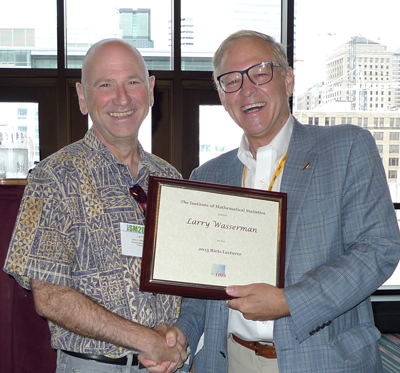As we reported in the last issue, Larry Wasserman was among five IMS Fellows recently elected to the US National Academy of Sciences. We’ll be writing about them them in the coming issues, and to start us off, Stephen E. Fienberg from Carnegie Mellon University, writes a profile about his colleague and friend:

Larry Wasserman (left, pictured with Ed George) presented the 2013 IMS Rietz Lecture at JSM in Montreal
In May, Larry A. Wasserman was elected to membership in the US National Academy of Sciences. Born in Windsor, Ontario, Larry attended the University of Toronto for both his BSc and PhD. He joined the Department of Statistics at Carnegie Mellon University (CMU) as a postdoctoral fellow in 1988 following completion of his PhD thesis on belief functions, written under the direction of Rob Tibshirani. His thesis was later recognized by the Pierre Robillard Award of the Statistical Society of Canada. Larry quickly rose through the faculty ranks and has remained at CMU, becoming a mainstay in both the Department of Statistics and the Machine Learning Department. Currently, he is also a member of the McWilliams Center for Cosmology and one of the conveners of the Topological Statistics and Statistical Machine Learning groups.
In 1999, Larry received the Presidents’ Award of the Committee of Presidents of Statistical Societies, for the Outstanding Statistician Under the Age of 40, and three years later, in 2002, the Centre de Recherches Mathematique de Montreal-Statistical Society of Canada Prize in Statistics. A Fellow of the American Statistical Association, the IMS, and the American Association for the Advancement of Science, Larry delivered the 2013 IMS Rietz Lecture, on topological inference.
Larry’s early research at CMU led to his recognition as a leading Bayesian innovator who has integrated insights into the foundations of inference with incisive and applicable methodological contributions. But increasingly over time he challenged conventional Bayesian thinking and argued for frequency-styled calibration of statistical tools. His contributions range from definitive treatments of Bayesian robustness and modern nonparametric estimation, mixture models, multiple testing, privacy, and causal inference, and highly successful collaborations with astrophysicists and statistical geneticists. His legions of collaborators come from across his departments at CMU and across multiple fields and countries.
A prolific contributor to the theoretical and methodological statistics literature, Larry is also an expositor par excellence and the author of two highly praised textbooks: All of Statistics (the winner of the 2005 DeGroot Prize from the International Society for Bayesian Analysis) and All of Nonparametric Statistics. He is a gifted lecturer and his Statistical Learning class in the machine Learning Department is legendary both for its insightfulness and for its demands on the students. Yet they flock to attend.
Beyond his technical and expository contributions, Larry is an agent provocateur, sometimes tongue in cheek but most often with purpose and insight. I offer two examples.
His essay in the recently published COPSS volume, The Rise of the Machines, begins: “Statistics is the science of learning from data. Machine Learning (ML) is the science of learning from data. These fields are identical in intent although they differ in their history, conventions, emphasis and culture. There is no denying the success and importance of the field of Statistics for science and, more generally, for society. I’m proud to be a part of the field. The focus of this essay is on one challenge (and opportunity) to our Field: the rise of Machine Learning.”
In a 2012 essay on refereeing, Larry begins: “Our current peer review is an authoritarian system resembling a priesthood or a guild. It made sense in the 1600’s when it was invented. Over 300 years later we are still using the same system. It is time to modernize and democratize our approach to scientific publishing.” He goes on to propose a system of open publication with posted reviews and commentary, including rebuttals.
Larry is a great colleague, one who is pushing the boundaries of our field and who is constantly challenging accepted wisdom and conventional thinking. He does so with zest, humor, and great insight. His election to the National Academy of Sciences recognizes these contributions, as well as his more traditional ones.
Comments on “Profile: Larry Wasserman”